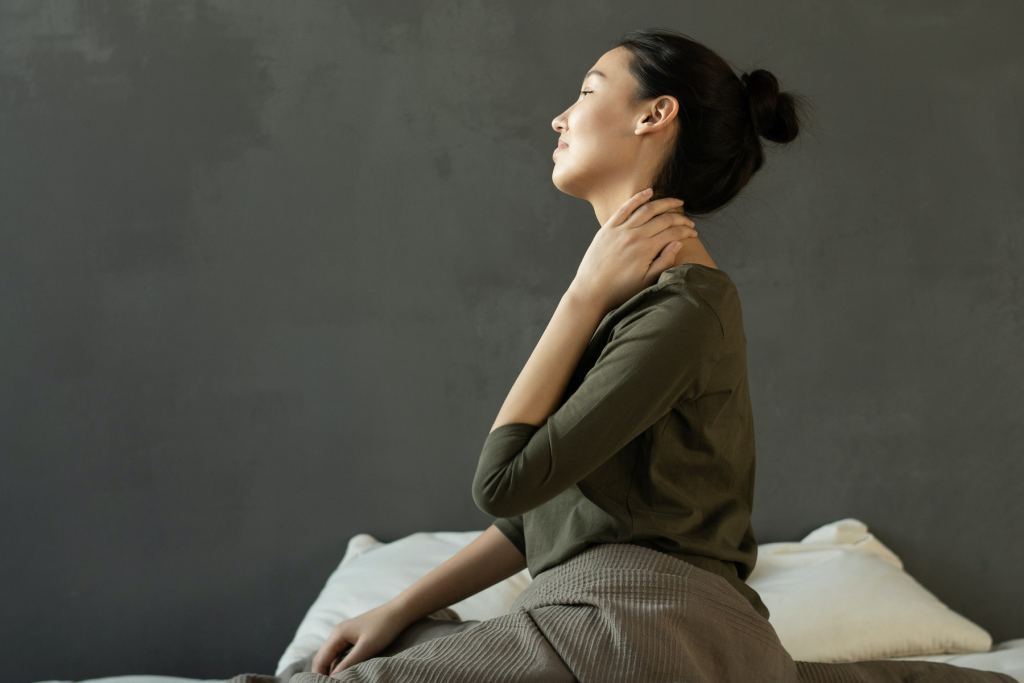Discover the connection between postpartum depression and anxiety and physical symptoms like back pain.
How Postpartum Depression and Anxiety Impact Physical Symptoms Like Back Pain

Ah, the joys of motherhood! The sweet smell of a newborn baby, the endless nights of sleep deprivation, and the overwhelming love that fills your heart. But amidst all the baby bliss, there’s a dark cloud that can overshadow this beautiful experience – postpartum depression and anxiety. These sneaky little monsters not only wreak havoc on your mental well-being but can also manifest in physical symptoms like back pain. Let’s take a closer look at this unexpected correlation, shall we?
Understanding Postpartum Depression and Anxiety
First, let’s tackle postpartum depression. It’s not just “baby blues” – it’s more like a raging storm of emotions that can hit you out of nowhere. This condition is no joke. And as if depression isn’t enough, postpartum anxiety likes to join the party, making your heart race and your mind go into overdrive.
Defining Postpartum Depression
Postpartum depression is a mood disorder that can strike within the first year after giving birth. It’s like having a persistent storm cloud hanging over your head, dampening your mood and sucking away your energy. The symptoms of postpartum depression can vary from person to person. Some may experience overwhelming sadness and a loss of interest in activities they once enjoyed. Others may feel a constant sense of guilt or worthlessness. Fatigue and changes in appetite are also common symptoms. It’s important to note that postpartum depression is not a reflection of a person’s ability to be a good parent or their love for their child. It is a medical condition that requires support and treatment.
Postpartum depression can have a profound impact on a person’s daily life. Simple tasks like getting out of bed or taking care of oneself can feel overwhelming. The emotional toll can strain relationships with partners, family, and friends. It’s crucial for individuals experiencing postpartum depression to seek help from healthcare professionals, as there are effective treatments available, such as therapy and medication.
Recognizing the Signs of Postpartum Anxiety
Now, postpartum anxiety is like a worrisome mosquito buzzing in your ear. It fills your mind with irrational fears and makes you feel like you’re constantly on high alert. It’s like having a personal security detail following you around, but instead of protecting you, they’re making you paranoid. The symptoms of postpartum anxiety can be both physical and psychological. Some may experience a racing heart, shortness of breath, or dizziness. Others may have intrusive thoughts or excessive worry about the safety and well-being of their baby.
Postpartum anxiety can be incredibly distressing and can interfere with a person’s ability to function and care for their baby. It’s important to remember that seeking help is not a sign of weakness, but a courageous step towards recovery. Healthcare professionals can provide guidance and support, offering strategies to manage anxiety and improve overall well-being.
It’s worth mentioning that postpartum depression and anxiety can coexist, amplifying the challenges faced by new parents. The combination of these two conditions can create a perfect storm of emotional turmoil, making it even more crucial to seek help and support.
In conclusion, postpartum depression and anxiety are serious conditions that can have a significant impact on the well-being of new parents. Recognizing the signs and seeking help is essential for recovery and the ability to provide the best care for both the parent and the baby. Remember, you are not alone, and there is support available to help navigate through these challenging times.
The Connection Between Mental and Physical Health
Okay, so now we’ve got a basic understanding of our dastardly duo – postpartum depression and anxiety. But how do these mental health issues impact our physical well-being? Well, my friend, let’s dive into the fascinating world of the mind-body link.
The Mind-Body Link: A Brief Overview
Imagine your mind and body doing a beautiful tango. When one takes a misstep, the other stumbles too. It’s like a synchronized ballet, but with less tutus. So, if your mind is feeling down in the dumps, don’t be surprised if your body starts singing the blues too.
But what exactly is this mind-body link? It’s the intricate connection between our mental and physical states. Our thoughts, emotions, and behaviors can have a profound impact on our physical health. It’s not just about feeling sad or stressed; it’s about how those emotions manifest in our bodies.
For example, have you ever noticed that when you’re feeling anxious, your heart starts racing, your palms get sweaty, and your stomach churns? That’s the mind-body link in action. Our mental state triggers a physiological response, activating the body’s stress response system.
But it doesn’t stop there. The mind-body link goes beyond just immediate physical reactions. Prolonged periods of stress, anxiety, or depression can take a toll on our overall physical well-being. They can weaken our immune system, increase the risk of chronic conditions like heart disease and diabetes, and even slow down the healing process.
How Mental Health Affects Physical Well-being
Here’s the scoop: stress and tension are not only emotional troublemakers but can also be physical pain generators. Think about it – have you ever felt your shoulders tightening up when you’re stressed? Well, imagine that tension migrating to your back and setting up camp there. Voila, back pain!
But it’s not just about muscle tension. Mental health issues can also disrupt our sleep patterns, leading to fatigue and decreased energy levels. They can affect our appetite, leading to weight gain or loss. They can even impact our cardiovascular health, increasing the risk of high blood pressure and heart problems.
Furthermore, the mind-body link works both ways. Just as mental health issues can impact our physical well-being, taking care of our physical health can have a positive effect on our mental state. Regular exercise, for example, releases endorphins, the feel-good hormones that can boost our mood and reduce symptoms of anxiety and depression.
So, it’s clear that mental and physical health are deeply intertwined. Taking care of one means taking care of the other. It’s not just about addressing the symptoms; it’s about understanding the underlying connection and promoting overall well-being.
Postpartum Depression, Anxiety, and Back Pain: The Correlation
Now that we’ve established the link between mental and physical health, let’s explore how postpartum depression and anxiety are the brainiacs behind your back pain.
Postpartum depression and anxiety can have a profound impact on a new mother’s overall well-being. The challenges of adjusting to life with a newborn, coupled with hormonal changes and sleep deprivation, can create a perfect storm for mental health struggles. However, what many people may not realize is that these psychological issues can also manifest as physical symptoms, such as back pain.
The Role of Stress and Tension in Back Pain
So, you’re a new mom, juggling postpartum hormonal changes, sleepless nights, and the pressure to be the perfect parent. Is it any wonder that your stress levels are through the roof? Well, that stress can become besties with tension, and together they like to wreak havoc on your poor back. How rude!
When you experience stress, your body releases stress hormones like cortisol, which can cause muscle tension and tightness. This tension can then lead to muscle imbalances and strain on your back muscles, resulting in pain and discomfort. Additionally, the constant worry and anxiety that often accompany postpartum depression can contribute to increased muscle tension, exacerbating any existing back pain.
Furthermore, the physical demands of caring for a newborn, such as lifting and carrying the baby, can put additional strain on your back muscles. When combined with the already heightened muscle tension caused by stress and anxiety, it’s no wonder that back pain becomes a common complaint among new mothers.
Hormonal Changes and Their Impact on the Body
Let’s not forget about those hormonal changes. Your body is going through a hormonal rollercoaster as it adjusts to postpartum life. These hormonal changes can throw your body out of balance, making you more susceptible to aches and pains – back pain included.
During pregnancy, your body produces high levels of hormones like estrogen and relaxin, which help prepare your body for childbirth. However, after giving birth, these hormone levels drop dramatically, causing a sudden shift in your body’s chemistry. This hormonal imbalance can affect the ligaments and muscles in your back, making them more prone to injury and pain.
Additionally, hormonal changes can also impact your mood and emotional well-being. Fluctuating hormone levels can contribute to feelings of sadness, anxiety, and irritability, which are all common symptoms of postpartum depression. These emotional struggles can further exacerbate any physical pain you may be experiencing, including back pain.
It’s important to recognize the interconnectedness of our mental and physical health. By addressing postpartum depression and anxiety, not only can we improve our emotional well-being, but we can also alleviate the physical symptoms, such as back pain, that often accompany these conditions. Seeking support from healthcare professionals, engaging in self-care practices, and building a strong support network can all contribute to a healthier, happier postpartum experience.
Coping Strategies for Postpartum Depression and Anxiety
Now that we’ve gotten to the bottom of the postpartum depression, anxiety, and back pain love triangle, let’s talk about some coping strategies. After all, we don’t want you to live in agony, my dear.
Seeking Professional Help: Therapy and Medication
You don’t have to go through this alone. There are superheroes in the form of therapists and doctors who specialize in postpartum mental health. They can help you navigate the stormy seas and provide you with the tools and support you need to conquer these pesky pirates called depression and anxiety.
Self-Care Techniques for Mental and Physical Health
Self-care is like a magic wand that can help you find balance and ease the burden of postpartum woes. Take some time for yourself, mama! Engage in activities that bring you joy, whether it’s going for a walk, practicing mindfulness, or simply indulging in a guilty pleasure like binge-watching your favorite show. Remember, you deserve it!
Prevention and Early Detection of Postpartum Depression and Anxiety
Now, wouldn’t it be great if we could prevent this whole postpartum depression and anxiety circus from setting up shop in the first place? Well, my dear friend, prevention and early detection are the keys to keeping the dark clouds at bay. Let’s dive into some proactive measures, shall we?

Importance of Regular Check-ups
Don’t skip those regular check-ups with your doctor, mama! They can keep an eye out for any signs of postpartum depression and anxiety, and catch them before they have a chance to ruin your day. Plus, it’s always nice to have someone to chat with while your little one gets their shots, right?
Building a Support Network
Remember that saying, “It takes a village to raise a child”? Well, it also takes a village to support a new mom. Don’t be afraid to lean on your friends, family, and fellow moms who have been through it all. They’ve got your back – quite literally when it comes to back pain!
So there you have it, my dear reader – the intricate dance between postpartum depression, anxiety, and back pain. It’s a complex tango, but with the right knowledge, support, and a sprinkling of self-care, you can glide your way through it. Now go forth, mama, and tackle those mental and physical challenges like the warrior queen that you are!



